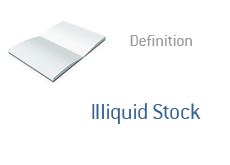Definition of Illiquid Stock
What is an “illiquid stock”? What is the definition of an “illiquid stock”?
Liquidity is all about how easy something is to sell.
If there is a market for an asset, and the asset can be easily sold, then the asset is said to be “liquid”.
An example of a “liquid asset”? Shares in Microsoft. Even if you owned a million shares of Microsoft, you could easily sell the entire position tomorrow without any hassle.
 So, an “illiquid asset” is an asset that is not easy to sell.
So, an “illiquid asset” is an asset that is not easy to sell. An “illiquid stock” is a stock in which there is not much of a market, which means that the stock will be hard to sell if you are looking to get out.
Owning an illiquid stock means that you are likely going to have to sell for considerably less than the current market price if you wish to exit a position.
For instance, let’s say that you own 10,000 shares of a penny stock that is currently trading for 50 cents per share and rarely trades more than 1,000 shares per day. In order to sell your entire position, you may have to be willing to accept 45 cents per share, or even lower.
The flip side of this, of course, is that illiquid stocks can ramp up in price extremely quickly if there is sustained buying pressure. That stock that you own 10,000 shares of could trade from 50 cents to $5.00 in one day if there is enough buying interest.
--
Davemanuel.com Articles That Mention Illiquid Stock:
None
